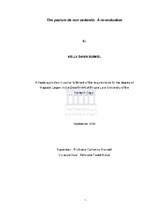The pactum de non cedendo :a re-evaluation
Abstract
Since the pactum de non cedendo is prohibitory by its nature and operation, our law should have proceeded with caution when determining its effect. This, unfortunately, is not what transpired in the locus classicus decision. Nor did subsequent cases correct this fatal ratio. The distressing truth is that the old authorities, upon whom the locus classicus judgment is based, were in all probability not writing about pacta de non cedendo. Strangely enough, when this was suggested by an academic in the field, it elicited no response. The lack of response evidences a lack of interest in the topic in general, partly due to the uncertain state of affairs in which the pactum de non cedendo operates, and partly due to the courts' unwillingness to rectify the situation. Despite the waning interest, the pactum de non cedendo is prevalent and appears in many types of contracts, most recently in the powerhouse factoring industry, and cannot simply be swept under the rug. This dissertation breathes new life into the pactum de non cedendo and discusses its validity and effect from a fresh perspective: A commercial perspective with a strong influence from American law. Hopefully this re-evaluation of the pactum de non cedendo will re-capture the attention of academics and judges alike, so that those in the position to do so, will re-consider its validity and effect.

